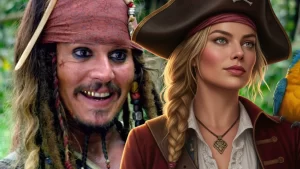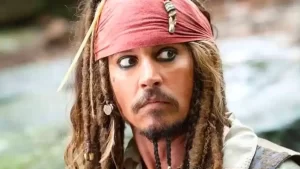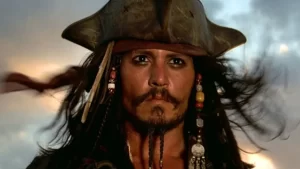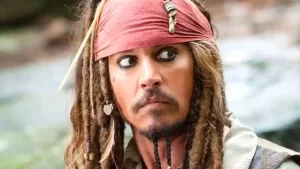Taking His Talents Back to the Caribbean
A Film Review of Pirates of the Caribbean: On Stranger Tides
By: Lawrence Napoli
 In Hollywood, there are A-listers and then there are unadulterated stars. Johnny Depp is a star — and a star’s worth is not measured by how many flavors of the week they can accumulate between modest box office earners, trips to the Mayo Clinic or brushes with the law. Pure performance maintained at a consistently high level over the course of time, regardless of the productions themselves, is what history will remember. It is an actor’s ability to amass a legacy at the same rate of popularity to get consistent work and succeed that allows the privileged few to choose their destiny through the roles they embrace that will cement their immortality. A quick glance at Depp’s filmography will reveal too many iconic roles to list, but his ability to morph a career that began as Freddy Kreuger’s victim in A Nightmare on Elm Street (1984) into an Oscar nomination for best male lead in a comedy/action role for Pirates of the Caribbean: The Curse of the Black Pearl (2004) is nothing short of remarkable. What makes this accomplishment more impressive is that he did it his way, namely; he picked most of the roles that interested him. Sure, he could’ve been like Tom Hanks and been the clean-cut white man studios drool over, but he never cared for that kind of attention or those kinds of roles. He was Justin Bieber before Justin Bieber; he detested the constant ass-kissing, the attention from hysterical teenage girls, and the schmoozing with production “power-brokers” that “boasted” an ability to make him a legend overnight. When Tom Hanks walks into the room, everyone wants to shake his hand, but everyone would rather hang out with Johnny because he is just that interesting.
In Hollywood, there are A-listers and then there are unadulterated stars. Johnny Depp is a star — and a star’s worth is not measured by how many flavors of the week they can accumulate between modest box office earners, trips to the Mayo Clinic or brushes with the law. Pure performance maintained at a consistently high level over the course of time, regardless of the productions themselves, is what history will remember. It is an actor’s ability to amass a legacy at the same rate of popularity to get consistent work and succeed that allows the privileged few to choose their destiny through the roles they embrace that will cement their immortality. A quick glance at Depp’s filmography will reveal too many iconic roles to list, but his ability to morph a career that began as Freddy Kreuger’s victim in A Nightmare on Elm Street (1984) into an Oscar nomination for best male lead in a comedy/action role for Pirates of the Caribbean: The Curse of the Black Pearl (2004) is nothing short of remarkable. What makes this accomplishment more impressive is that he did it his way, namely; he picked most of the roles that interested him. Sure, he could’ve been like Tom Hanks and been the clean-cut white man studios drool over, but he never cared for that kind of attention or those kinds of roles. He was Justin Bieber before Justin Bieber; he detested the constant ass-kissing, the attention from hysterical teenage girls, and the schmoozing with production “power-brokers” that “boasted” an ability to make him a legend overnight. When Tom Hanks walks into the room, everyone wants to shake his hand, but everyone would rather hang out with Johnny because he is just that interesting.
Bro-mances aside, Depp is the one element that makes the Pirate films work, not because Depp himself is an icon, but because Captain Jack Sparrow is a character unlike any other in the history of film. In Stranger Tides, Depp finds himself at somewhat of a loss for common faces sans Orlando Bloom, Keira Knightly and most of the crewmen from the previous three films. Only Geoffrey Rush has the chops to be a visceral foil to Depp, but, unfortunately, their characters are not at odds and a truly epic confrontation never occurs. Thus, a wider birth was afforded Depp to rob every scene with refined charisma, comedic timing and an excellence of elocution. It would truly take a stone-hearted SOB to not smile when Captain Jack is on the screen. Certainly, he comes off as a bit of a loon most times, but we all know there’s a method to his madness — and it is Depp’s ability to instantly shift demeanor in the most sincere way that has allowed the audience to be completely at ease with Sparrow’s spontaneous nature. I was a little disappointed that he was unable to really steam up the scenes he shared with Penelope Cruz, to make the same kind of connection Bloom and Knightly developed, but then I realized how contrary to character such intimacy would be. At the end of the day, Jack Sparrow can only truly love Jack Sparrow with a healthy supply of spiced rum being a close second. Depp clearly has fun with this role, and it shows on the screen, which translates to the audience. Only those standing in line for the “un-fun” rides at the amusement park will not appreciate Depp’s performance in Stranger Tides.
Productions that place such emphasis on the performance of one actor always run the risk of selling the rest of the cast short of opportunities to shine. In some cases, the actors are to blame for not making the most of the scenes they have, while the rest of the time one has to shrug one’s shoulders and say, “Well, that’s just the way it is.” Penelope Cruz was cast specifically to fill the vacant “potential love interest for Jack.” Thankfully, she plays a new character to the franchise (Angelica) and not written in as: “Trust us, it’s Elizabeth Swan!” I was quite impressed with how well she spoke English for the duration of the film. Normally, her diction is about as smooth as a baby carriage careening down a flight of stairs . . . into a pool of great white sharks. Although she looked very good, I would have been more impressed if she engaged in more of her own stunts and combat; Director Rob Marshall used every trick in the book to shelter Cruz from the hardships of training for basic fencing.
I thought the role of Philip, played by Sam Claflin, to be a painfully transparent attempt to channel Orlando Bloom. Let’s forget the obvious physical similarity between the two characters and point out the fact that Claflin slides right into the vacant role of “the forlorn, sympathetic lover.” Bleh! Claflin was so shamelessly pigeon-holed into Will Turner-light that I was rolling my eyes at every line that came out of his mouth. They say you never know how much you miss something until it’s gone, and as much as I believe that Orlando Bloom is a pretty boy with minimal skills that mooches off of great casts, he was sorely missed in Stranger Tides.
The only thing I will say in regards to Geoffrey Rush as Barbosa, other than shear brilliance, is that Jerry Bruckheimer and Rob Marshall have done us all a severe disservice due to the extreme brevity of Rush’s screen time!
The weakest link by far was Ian McShane as “the pirate everybody knows,” Blackbeard. As the only real antagonist to this particular installment of Pirates, there is a certain level of menacing intimidation required for this type of role. That being said, McShane’s performance is perhaps the most charmingly soft presentation of Blackbeard I have ever experienced in any form of media. Following exceptional performances by Geoffrey Rush and Bill Nighy, as this franchise’s current antagonist, is no easy task — but McShane’s Blackbeard is just not mean enough to be bad. When Blackbeard has someone killed, his demeanor is quite calm and detached which works great for Patrick Bateman, but does nothing for a pirate. A script can only outline villainy in terms of the action that is occurring. It is an actor’s job to fill in the subtle nuance of “how” said villainy is engaged. Unfortunately for McShane, he defined the entire role of Blackbeard through subtlety.
No good pirate film is complete without some good old fashioned, swash-buckling fun. Although there were moments of greatness, like the fight between Angelica and Sparrow, generally speaking, the swordplay was not entirely up to par. This holds especially true for the climactic battle where Jack Sparrow is curiously removed from the action. The Curse of the Black Pearl maintains the action standard for which all of the sequels have attempted to one-up by featuring more naval combat or CG, but nothing truly substitutes for the skillful rattling of sabers. I will note how much I appreciate the use of practical special effects with quality wire work, as opposed to digitizing that which seems physically impossible in this film. When done well and shot correctly, practical effects will always produce a bigger impact than anything produced by current generation digital effects. I give Stranger Tides much credit for sticking with this concept for the action scenes in order to maintain a stylistic consistency for the franchise.
The story of Stranger Tides raises more questions than answers in regards to the exploits of Captain Jack Sparrow. After overcoming his own undead crew, outsmarting Davy Jones and coming back from the dead, there’s only so much any character could possibly do to match this level of adventure. A quest for immortality, via the fabled Fountain of Youth, seems like a worthy follow up in Jack’s memoirs, but I was beside myself as I tried to understand why Jack was clearly disinterested in actually pursuing this end. I will not say that Ted Elliot’s screenplay was bad for not placing any emphasis on action on the ocean or swordplay, but both are curious omissions for a film about pirates. Perhaps, the true weakness of the script was that Jack Sparrow doesn’t have a nemesis that really has it in for him as a result of some disagreement or parlay request that went horribly wrong in the past. Without some form of personalized conflict, fantasy adventure films like this usually go belly-up without some “X” factor to cover up all the mistakes. The end of the story is surprising, but nowhere close to being satisfying which probably speaks more truth to the nature of Jack Sparrow as a character — an enigma of a man with a talent to work every angle with no clear purpose, desire or mission. If the script’s purpose was to highlight this fact, well done! Otherwise, The Curse of the Black Pearl was superior fiction in every conceivable way.
After a film like Stranger Tides, I can tell why Johnny Depp has called for a hiatus from the franchise and it has nothing to do with him taking time off to rest his weary bones. Johnny wants what the audience wants at the end of this film: a recalibration of the franchise. This film, along with At World’s End, really allowed Depp to take Sparrow in many fun and entertaining directions as a character, but one character cannot be the whole story — and Depp knows this is happening. It is the inevitable watering-down that results from mass producing sequels and the fact that Depp would have no problem walking away from Bruckheimer, Marshall and Disney in a moment’s notice for no reason at all should put the powers that be on notice. No Pirates of the Caribbean film works without Captain Jack Sparrow — and no one can play that role, but Johnny Depp. Although Stranger Tides was an improvement from the very disappointing third film, it just isn’t as funny, daring and epic as the first. I wonder if Disney would consider hiring Justin Lin to get the franchise back on track. Just look what he’s done for The Fast and the Furious.







